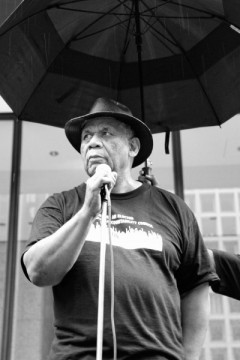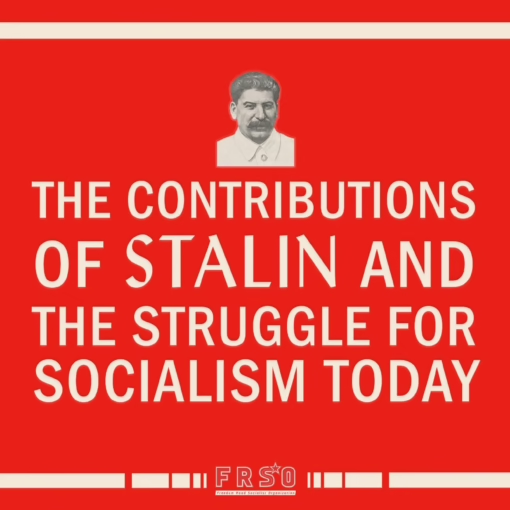By Frank Chapman
Black liberation is a not a state of mind that can be characterized as “Black Marxism” or the “Black Radical Tradition.” Nonetheless, there is an ideological need to settle accounts on this question of the identity between the “Black Radical Tradition” and Marxism.
My initial response to the formulation “Black Marxism” is that it is unscientific. And then I read this from the introduction of Cedric Robinson’s book Black Marxism: The Making of the Black Radical Tradition:
“This study attempts to map the historical and intellectual contours of the encounter of Marxism and Black Radicalism, two programs for revolutionary change. I have undertaken this effort in the belief that in its way each represents a significant and immanent mode of social resolution, but that each is a particular and critically different realization of a history. The point is that they may be so distinct as to be incommensurate. At issue is whether this is so. If it is, judgements must be made, choices taken.” (See Black Marxism: The Making of the Black Radical Tradition, p. 1)
If this is the first order of business, then according to Robinson, Marxism and Black Radicalism must be examined and cross-examined from two different standpoints, namely: 1) Marxism from the standpoint of “its profound but ambiguous indebtedness to Western civilization” and 2) Black Radicalism from standpoint that the “…very circumstances of its appearance has required that it be misinterpreted and diminished.” (This is what DuBois accuses the capitalist ruling class of doing.)
In other words, Robinson sets out to demonstrate to us by way of scholarly investigation whether or not Marxism and Black Radicalism are commensurate. Somehow, we suspect that through this peculiar construction we will come to understand how the making of the Black Radical tradition is related to Black Marxism.
Well, Robinson doesn’t waste time. He offers up his conclusions before the proof in the outline to the construction of his study. In his study, summing up the better part of two centuries of the intellectual left of Europe opposing capitalist class rule, Robinson makes a number of assumptions regarding the works of Marx, Engles and Lenin. However, the assumption I wish to speak to is his first one.
First assumption: Marxism was founded on the study of the expropriation and exploitation of labor taken up by Engles and later elaborated by Marx’s materialist theory of history; his recognition of the evolving systems of capitalist production and the inevitability of class struggle.
Marxism as a doctrine was partially founded on the study of capitalism as a system of expropriation and exploitation or what Lenin called British political economy. As a doctrine, according to Lenin, Marxism “…emerged as the direct and immediate continuation of the teachings of the greatest representatives of philosophy, political economy and socialism.”
How does one even begin to understand Marx’s “materialist theory of history” if one doesn’t recognize that “historical materialism” came about as a result of Marx and Engles settling accounts with German ideology, French socialism and English political economy.
In fact, Robinson avoids dealing with the sources and component parts of Marxism by simply declaring that Marxism is a Western construction, “a conceptualization of human affairs that is emerged from European peoples mediated, in turn, through their social orders and their cultures. Certainly, the philosophical origins are indisputably Western.” Not really, for what emerged in Europe during the so-called Renaissance was passed on to them by the Arabs and Islamic culture dominant in North Africa and Spain. That is, mediated through the non-Western cultures of North Africa and the Moors. European peoples did not develop their culture in isolation, but in fact drew much knowledge from the more advanced non-Western cultures of Africa and the East.
So, rather than speaking specifically to the sources of Marxism, as Lenin did, Robinson is saying Marxism is stamped with certain inherent limitations due to it emerging from the historical experiences of European peoples. But Marxism as a science is no more uniquely European isolated from the high road of human civilization than mathematics, medicine and chemistry.
Robinson’s declaration is an abstraction because every idea or system of ideas is born in a particular culture at a particular time, and therefore, reflects the economic system and social knowledge at that historical moment. Neither Marxism or any system of social knowledge exists independently of social knowledge as a whole. This is especially true given the way civilizations develop and interact with one another. For example, Islamic culture in North Africa developed science and mathematics ahead of modern European states. Ibn Khaldun, a North African philosopher and scholar was a pioneer in the development of the social sciences and some of the same ideas that originated with him can be found in the works of Marx.
The principal question here is: did Marxism provide humankind and especially workers and oppressed peoples with instruments of knowledge to be used in achieving liberation from class, race, gender and national oppression? And the answer is a resounding yes.
Marxism and Black liberation are indeed historically related radical traditions that spring from the common soil of capitalism. But they are not of the same measure. The struggle for Black liberation is longer. There was Haiti in the Caribbean and Quilombo in Brazil before there was Robert Owen’s Utopian communes, the Paris Commune or the Great October Revolution. Yet the historical fact of the matter is that Marxism recognized from its inception that the emancipation of the working class is the emancipation of all humanity and that, so long as Black workers and the colonially and nationally oppressed are held in bondage, white workers or workers as a class cannot be free. This is part of the revolutionary essence of Marxism.
This revolutionary essence is what was missing with the Utopian Socialists for whom the abolition of Black slavery was not a primary issue. And it is this revolutionary essence that was betrayed by the Second International or the Social Democrats.
The Bolshevik Revolution reclaimed the revolutionary essence of Marxism and ended the era of socialism being wedded to the white, national chauvinism of Europeans. The Manifesto of the Communist International, in 1919, declared: “Colonial slaves of Africa and Asia! The hour of proletarian dictatorship in Europe will strike for you as the hour of your own emancipation!”
Frank Chapman is a member of the Freedom Road Socialist Organization’s central committee.





